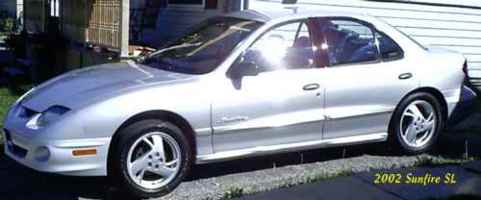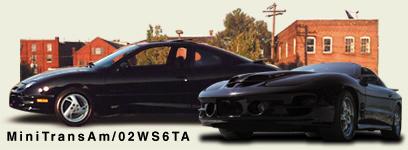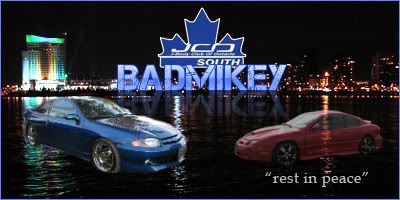hey guys, just wandering, do you think 114,000 miles is too late to start running synthetic oil ion my engine? Its a 2000 cav w/2200. Just out of curiosity. Thanks guys
<3 Cav's 4 ever
it wouldnt hurt, but probably wouldnt be that much of a benefit

I'm not always sure what somebody means when they ask is it "too late" to do something like this. If the engine has been damaged due to neglect already, then it's too late for any oil to help it. Using a synthetic oil won't solve any issues - it simply does its job better than conventional oil under some conditions (and can often do so for longer intervals).
Personally I use synthetic now in the winter - because I know it will flow better at low temperatures, and because I feel that I can safely leave it in a bit longer than conventional oil - so if the weather's still crappy when it's due for a change in February, I can put if off for a while knowing that it's still doing an adequate job (and I won't have to deal with getting a car up in the air on the snow). Because I've been doing this for a few years now, it's easy to look for the best "sale" throughout the year and pick it up then - so the cost difference is minimal.
Most conventional oils these days are much better than they ever have been - so although synthetics still have some advantage, their degree of superiority is probably less than it used to be. In other words - don't expect it to feel like a "brand new engine" just because you've put a synthetic lubricant in there. I always listen carefully to mine, and monitor my gas mileage with every fill-up, and I can honestly say I can't tell the difference. I think I've done about 26 oil changes on my car now over the last 7 years, so if a difference was going to be apparent, I'm sure I would have noticed it by now. I've used various conventional oils (Mobil, Valvoline, Quaker State, Petro Canada, Castrol) and various synthetics (Amsoil 0W30 + 5W30, Mobil 1, Castrol Syntec), as well as a couple of synthetic blends. My advice based on my experience - if you find a name-brand synthetic on a good sale - go for it. Otherwise, it's probably not worth the money, unless it makes YOU feel better knowing it's in there - then go ahead. You certainly can't hurt anything by running it (other than depleting the cash in your wallet slightly more).
John

I have been using synthetic since I've bought my cav on 100k miles and have had no unusual problems and im going on 158k miles now.
The question of natural verses synthetic as an issue has really been debated over the years, but thereís another concern people might consider when making oil choices and it might be more important in the long term depending on the engines they have.
The API (American Petroleum Institute) developed a Service Classification system decades ago in response to increasing demands on engines that occurred post WWII as highways developed, engine sophistication increased, speeds increased, operating temperatures increased, etc.. These classifications dealt with the additive packages oils contained pertaining to anti-friction, anti-oxidation and acid neutralization, among other things, and started with SA for spark ignition and CA for compression ignition. The classifications evolved quickly as the standards were beefed up to accommodate engine development with SC appearing in 1964, SD in 1968 and SE in 1972. Through this period, the additive packages were improved to hold up under the increasing stresses and operating conditions then found in automotive engines.
Things got complicated in 1975 when catalytic converters were adopted virtually across the board as the two main high pressure anti-friction additives, zinc and phosphorus, were found to clog the converters over time. The most wear prone areas of the engines of that period were the camshaft lobes and tappets (lifters, followers, whatever) and zinc and phosphorus were their saviors. But, future classifications (with help from the EPA) mandated the reduction of both zinc and phosphorus to the point that the current classifications SJ, SL and SM have little to none. (All previous classifications are obsolete, though motorcycle specific oils of SF/SG rating are still available at high cost.)
The result of all this is that the SH classification of 1994 was the last to contain amounts of zinc and phosphorus deemed suitable for use in flat-tappet (lifter, follower, whatever) camshaft engines. The automotive industry responded by developing (or updating) engines with roller-tappet (lifter, follower, whatever) designs, which of course already existed in mostly racing applications, but werenít in wide general use as these things take time and cost money. So, if you hear owners of 1960ís era muscle cars complaining of not being able to find suitable oil, thatís one reason. Some use motorcycle specific oil at enormous cost, others put in roller cams, others do other things or try other additives. (We wonít even go into the nightmare many motorcycle owners have since their engines often have wet clutches and integral transmissions.)
What does this mean to J-body owners? Well, if you have an Eco, youíre good to go as theyíre a modern roller design and the Service Classification is a non-issue. But, the older push-rod engines and even the Quad4/Twin Cams engines are technically flat-tappet engines. (The 60 and 90 degree V6ís were updated at some point along the way, but I don't know the years.) The ownerís manual for my (1999) Cavalier doesnít specify what API classification oil to use, but SF/SG (good for flat-tappet cams) were in use when the Quad4 engines were developed and SL (not good) was current in 2001 about the time the Twin Cams were discontinued. So what do you use? Well, Iím using a diesel classification oil (current classification are CF through CJ-4), some of which still contain some zinc and phosphorus. And, most classifications are available in natural and synthetic. And, Iím not going to lose any sleep about it. I recommend everyone do the same (the not lose any sleep part, at least). You method may vary, lifeís too short anyway and my LD9 will likely outlive me. Take care. - Mark

As far as I'm aware, GM updated almost all of their engines to use roller tappets or followers beginning in the mid 1980's. I'd have to look up the LD9 twin cam to see but I'd be surprised if it didn't. The 2200 that is the engine in the original poster's question most certainly does have roller tappets. Even my 4 cylinder push rod 1987 Buick Century I used to own had rollers. I don't know about Ford, but I know that Chrysler also changed over to roller cams in 1985 on the V8 engines, so it's certainly not a really recent development. I'm sure that manufacturers have plenty of warning as to what the API changes are going to be, so they don't just come as a surprise. Some manufacturers have even been known to work with the API when developing new classifications to ensure that they can meet the requirements of new engine designs.
As long as whatever oil you choose has a "starburst" symbol on it, and meets current API requirements, you shouldn't have any compatibility issues between whatever new oil you choose to go along with what's been in the crankcase up until now. Stick to the recommended change intervals, and your engine will likely be happy with whatever oil you choose to run. If you tend to be a bit "forgetful", then synthetic may be a good idea - just don't push it too far unless you're willing to send in samples for used oil analysis. Personally I spend my money on just doing another oil change, rather than spending half that money just to see if it's "time" yet. I'm sure my engine won't mind. If you are good at keeping on top of getting the changes done on time, then any conventional oil will likely serve the purpose just fine.
Although I've read differing opinions on it, for the older engines, I've read that the molybdenum disulfide (spelling?) that they've used to replace the zinc can be just as effective - so the "danger" of using the newer oils in the old engines is questionable. I've got an older car (1965 Valiant), and owned at least a dozen pre-1980 flat-tapped cam cars over the years, and never had a camshaft failure. I've got to know quite a few other people over the last few years from cruise nights and shows, and I haven't heard of anyone complaining about their camshafts failing either, so although the new oils are formulated differently, it's not like "instant death" to an older motor if you use them. As far as I'm aware, none of this likely applies to any "J" ever built (except possibly some early 1st generation ones), so don't concern yourself too much with it. This was strictly a start-up issue only, when oil hadn't begun to flow yet.
John

John, I think you're a little early. The first reference I can find to GM adopting roller-follower cams was on the '87 Corvette/Camaro smallblocks. I found another reference stating the truck V8's didn't get them until '96. The Quad4/Twin Cam engines from '87 through '01 do not have roller designs. (I've had them apart.) I can't speak with authority on when the pushrod 4's or V6's were updated, but the LQ1 V6 (I've also had apart) is a 60 degree V6 quad cam engine (a beauty, in my opinion) that GM built through '97. It used the same camshaft arrangement as the Quad4/Twin Cams where the flat hydralic tappets are actuated directly by the cam lobes. And I do know that the Ecotech (another beauty, in my opinion) was a roller design from the start. I agree that there's not much cause for concern on modern engines and I've also not personally had a failure on one of my own, but the concerns had been frequently voiced in vintage car and motorcycle circles. The point is fairly moot now as oils are now available for all generations of automotive engines. (Even the Studebaker Drivers Club is happy.) Take care. - Mark

My personal recomendation is to run Valvoine Maxlife 5w-30 and change it every 5k. It's a semi synthetic plus it's got all the extra additives to keep seals from drying out and shrinking. Make sure you use a good filter too. AC-Delco, Purolator, and Mobil1 are good filters. Don't touch a Fram. Ever.


I know that I had to take apart the 2.5L in my 1988 Celebrity I used to own, and it definitely had rollers in it. Although there were some other changes to the engine that year, I believe from what I remember that the valvetrain was a carry-over from the previous year (my 1987 Century).
Since in a "previous lifetime" I was more familiar with Mopar's products, and that I found the rollers in my 1988 Chevy product, I figured that they had made their way into many others as well. I was quite sure that I saw that my mother in law's old '89 Caprice had rollers in it (according to the service manual) - it had a 305 in it.
Regardless of any of this, with the exception of certain much older engine designs, I don't think there's much to be concerned about on the zinc issue. Like you said Mark, there are specialty oils available for virtually any application now anyway. I just don't think that any "J" would likely require anything out of the ordinary to live a good life. Most of the ones I've seen around here die from either rust or neglect (which usually begins when the rust starts to appear, or sooner). I have yet to scrap a car because it didn't run anymore - they've all had serious "body cancer" when I pulled them off the road. Since I bought this one new, I'm putting a good effort into making sure that it doesn't see the same fate - and so far I think I'm winning the battle. Not that the climate isn't trying though... the car gets a thorough oil spray every fall, and a touch-up in the spring to limit its effects. I figure that if I keep it looking as new as possible, then I'm less likely to "let things go". Boredom may eventually have an influence on that, but the current condition of my pocketbook is helping ward off any ideas there...
John
P.S. - I added photos of my current and 1 previous "vintage" rides today.

John, I know we've digressed from the original oil question, but I have to add a comment about the salt and rust issues you discussed. You sound like someone who looks at his vehicle acquisitions in somewhat lengthier terms than many, and I feel the same way as my current J-Body will likely be the last "toy" or project car I own. (I've had many others over the decades, but have to realize and accept the limitations imposed by age, finances, alleged retirement possibilities, etc.) As for salt and rust, municipalities throughout the US are frantically looking for ways to economize and are retreating from less corrosive (but more expensive) ice melting compounds back to salt. I live in an Idaho border town and commute to Washington to work. Idaho (at least the county I live in) went back to salt last year while Spokane, Washington, hasn't (yet). It's just a sign of the times until economics takes over. I applaud your efforts to stem the rust tide and recommend everyone in freezing areas do the same. I grew up in southern California and never saw ice locally the thirty years I lived there. Things are very different here and a rust-free, rock-chip free used car is indeed a rarity. My J-Body (according to CarFax) started life in the desert (Las Vegas, NV) and spent the last several years in a rainy but still salt free environment (Seattle, WA). I know many locales have always used salt and manufacturers have made progress, but you own attention to detail will ultimately prevail. Yes, it may only be a J-Body, but some people's project car budgets are more modes than others. And, I'm still having fun. - Take care. - Mark

dont waste your money. its really only for protection from day one, but wont hurt anything ethier

Did I mention I drive a 2000 Lumina now?-----wigm-tuners.org member












